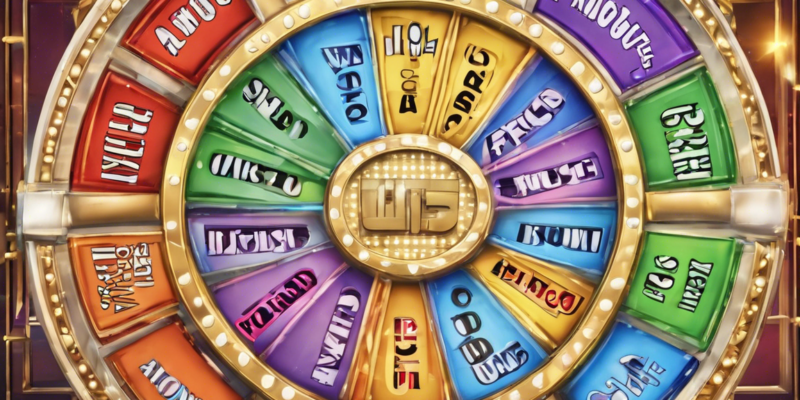Introduction
In the world of entertainment, one iconic phrase has stood the test of time and become synonymous with the unpredictability of luck and fate: the “Wheel of Fortune.” This timeless phrase has captivated audiences for generations, whether through the classic TV game show or as a metaphor for life’s ups and downs. But what is the true meaning behind the Wheel of Fortune phrase, and why does it continue to enchant us to this day?
Exploring the Origins
The concept of the Wheel of Fortune can be traced back to ancient times, with roots in Greek mythology and medieval philosophy. In Greek mythology, the goddess Fortuna, or Tyche, was often depicted with a wheel to symbolize the ever-changing nature of fate. This idea was further developed in medieval Europe, where the Wheel of Fortune was a common motif in literature and art, representing the cyclical nature of life and the transient nature of wealth and power.
Interpreting the Symbolism
At its core, the Wheel of Fortune symbolizes the inevitability of change and the unpredictability of life. Just as the wheel spins, our fortunes can rise and fall in unexpected ways. This concept is captured in the famous phrase, “What goes up must come down.” Whether we are experiencing moments of success or facing challenges, the Wheel of Fortune reminds us that nothing is permanent and that we must be prepared for whatever may come our way.
Applying the Concept
The Wheel of Fortune phrase has found its way into various aspects of popular culture, from literature to film to music. In literature, authors often use the theme of the Wheel of Fortune to explore themes of destiny, free will, and the human experience. In film, the phrase has inspired countless plotlines centered around characters grappling with the capricious nature of fate. Even in music, artists incorporate references to the Wheel of Fortune to convey the universal struggle with uncertainty and change.
Philosophical Interpretations
From a philosophical perspective, the Wheel of Fortune represents the idea of “eudaimonia,” or flourishing, as espoused by ancient Greek philosophers like Aristotle. The wheel’s constant motion symbolizes the journey towards finding fulfillment and living a well-lived life. By embracing the twists and turns of fate, we can learn to adapt, grow, and ultimately find meaning and purpose in our lives.
Navigating Life’s Challenges
In our modern-day context, the Wheel of Fortune phrase serves as a poignant reminder to embrace life’s uncertainties with resilience and courage. Just as the wheel turns, we must learn to navigate the highs and lows with grace and humility. By cultivating a sense of balance and equanimity, we can weather life’s storms and savor its joys with gratitude and humility.
FAQs (Frequently Asked Questions)
Q: What is the significance of the Wheel of Fortune in tarot card readings?
A: In tarot readings, the Wheel of Fortune card symbolizes destiny, fate, and the cyclical nature of life. It serves as a reminder that change is inevitable and that we must adapt to new circumstances.
Q: How does the concept of the Wheel of Fortune tie into the concept of karma?
A: The notion of karma, or the law of cause and effect, is closely related to the Wheel of Fortune in that our actions and intentions can influence the outcomes we experience in life. By understanding the interconnectedness of all things, we can approach life with mindfulness and compassion.
Q: Are there any practical ways to apply the teachings of the Wheel of Fortune in daily life?
A: Yes, by cultivating mindfulness, practicing gratitude, and embracing change, we can embody the teachings of the Wheel of Fortune in our daily lives. This includes staying present in the moment, learning from setbacks, and celebrating our successes with humility.
Q: How can the Wheel of Fortune phrase inspire creativity and innovation?
A: The Wheel of Fortune can inspire creativity by encouraging us to think outside the box, take calculated risks, and embrace uncertainty. By viewing challenges as opportunities for growth, we can tap into our creative potential and discover new ways of approaching problems.
Q: What are some examples of the Wheel of Fortune phrase in popular culture?
A: The Wheel of Fortune phrase has been referenced in various forms of media, including literature (such as Shakespeare’s plays), music (such as songs by The Rolling Stones), and film (such as the movie “Slumdog Millionaire”). Its enduring appeal lies in its ability to capture the essence of life’s unpredictable journey.
In conclusion, the Wheel of Fortune phrase continues to captivate us with its timeless wisdom and universal appeal. Whether we encounter it in ancient myths, philosophical texts, or modern entertainment, the message remains clear: life is a journey of twists and turns, and it is up to us to embrace the ride with courage and grace. Let us heed the lessons of the Wheel of Fortune and approach each day with a spirit of openness, resilience, and gratitude.

